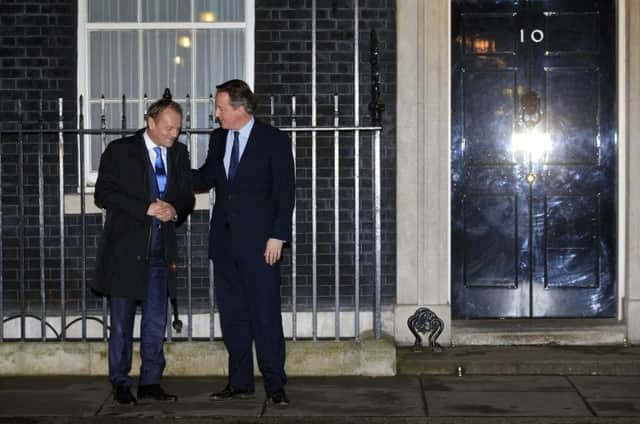Scotland must not be forced into hasty exit, says EU chief


The call came as David Cameron was expected to press his demand for an “emergency brake” on EU citizens claiming welfare in the UK – immediately after an In-Out referendum – in talks with European Council president Donald Tusk last night.
Mr Tusk met Mr Cameron in Downing Street for a working dinner to thrash out the details of proposed reforms which he is expected to publish within days, ahead of a summit this monthh.
Advertisement
Hide AdAdvertisement
Hide AdHowever, senior official Ms Georgieva yesterday said “every effort” was being made to avoid a scenario where Scots are forced to choose between remaining in the UK and the EU, amid suggestions Scotland could be pulled out of the EU against its will.
First Minister Nicola Sturgeon has previously said the EU referendum could create the circumstances for another vote on independence, while Tony Blair has predicted a UK vote to leave the EU would lead to an independent Scotland.
Ms Georgieva, speaking on BBC’s Sunday Politics Scotland, said she did not want to speculate on how the EU might deal with the UK as a whole voting to pull out and Scotland voting to remain.
She said: “We make every effort for the Scottish people not to have to face a choice between Britain and the EU. So, that is not a choice that we would like to ever face.”
Her claims came as the pressure group Scotland in Union said that Scotland’s economy could be left £1.5 billion a year worse off if the UK pulls out of the EU, in a new report which also claims the case for Scottish independence would be weakened by Brexit.
Meanwhile, Mr Cameron’s talks with Mr Tusk were expected to be dominated by changes to the rules about EU citizens claiming welfare in the UK.
The measure has been put forward by Brussels as an alternative to Mr Cameron’s plan to impose a unilateral four-year curb which other member states ruled out as discriminatory and in breach of the freedom of movement principle.
Senior UK government sources said the Prime Minister was now prepared to accept it as a “stop-gap” measure – on the condition he received assurances it could be triggered by present levels of immigration and could remain in place “long enough to resolve the underlying problem”.